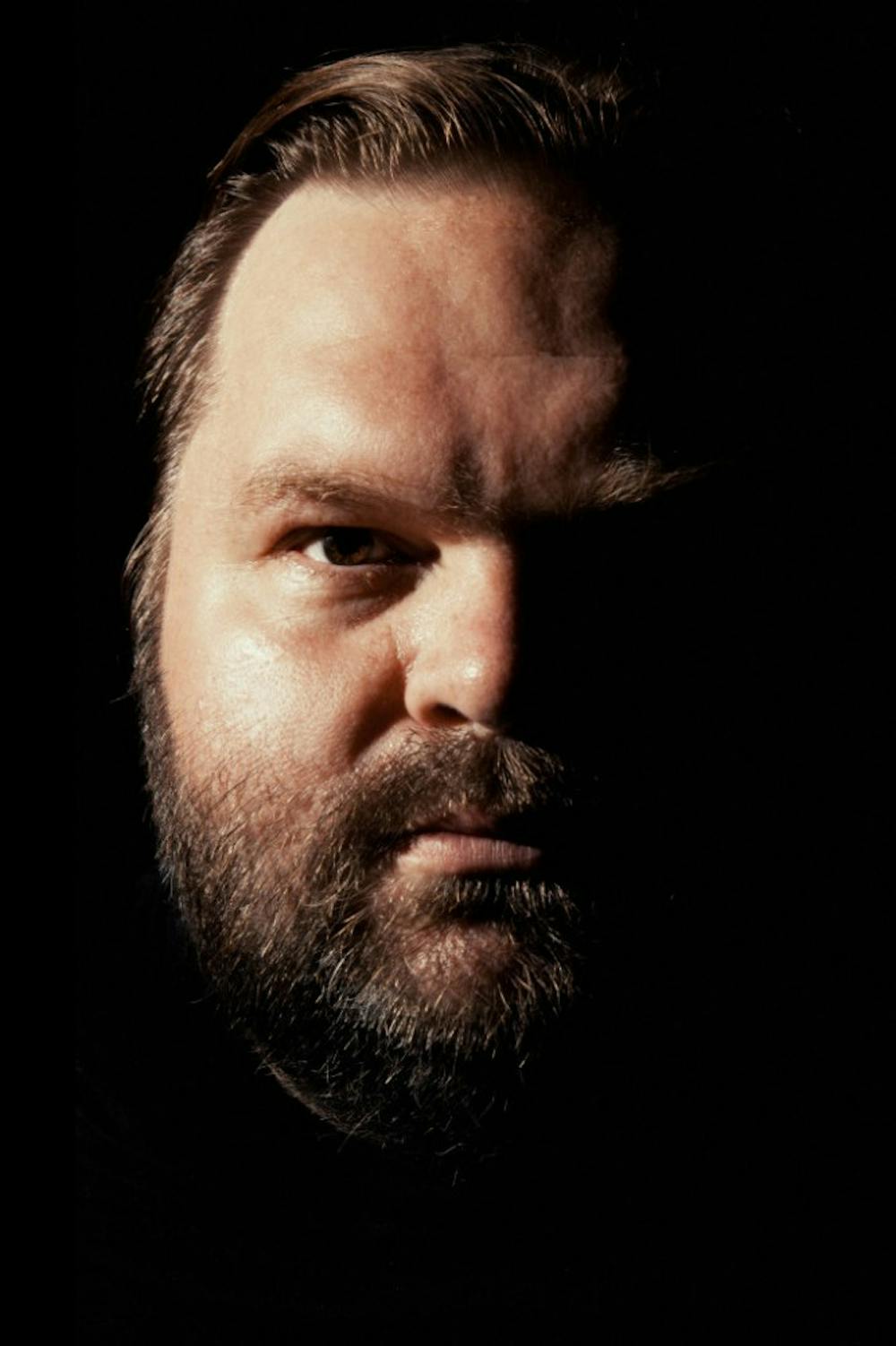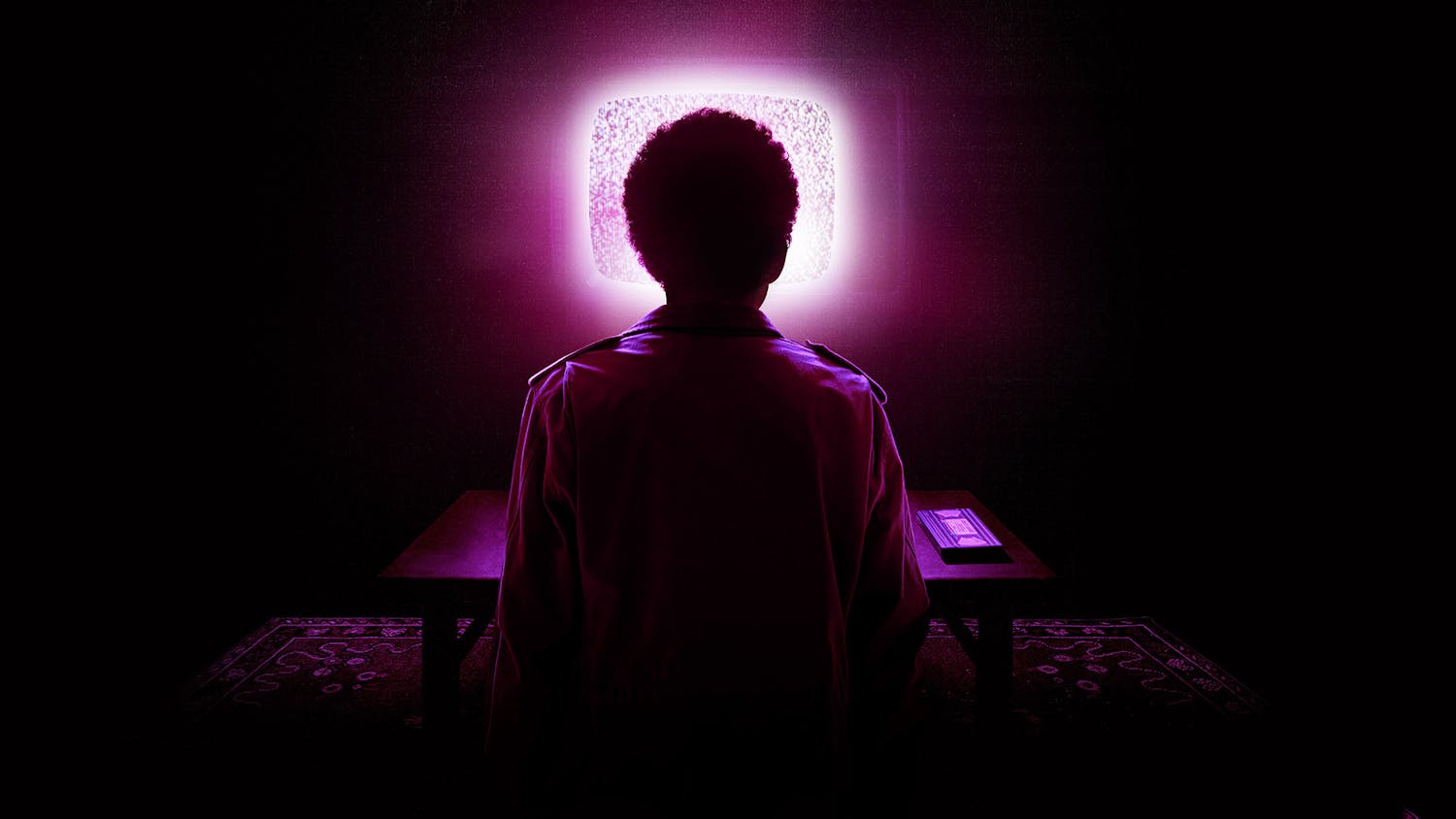In a society dominated by technology, it is oftentimes difficult to distinguish between what is possible and what is necessary. Critically-acclaimed monologist Mike Daisey brought this complicated question to the forefront of the audience’s minds in Faster Better Social, a 75-minute performance on Friday and Saturday, Jan. 16 and 17 at the Wright Memorial Theater. Working around the theme of technology, Daisey engaged the audience in a delightful, provocative and improvised speech on the evolution of the iPhone, the human species’ transformation into cyborgs, his self-proclaimed addiction to his phone and everything in between.
Seated behind a desk onstage and swathed in a bright yellow spotlight, Daisey opened with a poignant remark: “We’ve reached a tipping point … when we have to beg you to turn off phones before the show.” He proceeded to announce, “This is kind of an intervention. We’re addicted together.”
This tone of keen self-awareness and unapologetic honesty carried on through the rest of the performance, with Daisey conceding, “I’m a man of the times. Like you, I’d rather be on my phone.” His admission drew laughs of understanding from the audience, but quickly segued into more uncomfortable truths about the relationship between humans and screens.
Despite the world of infinite possibilities available at our fingertips, Daisey expressed concern over the amount of control that technology can hold over us. From the feeling of anxiety that overcomes us when we are away from our phones for too long, to the overbearing ways of Facebook Messenger, which demands to have sound notifications turned on in order to function properly, he pointed out that the tool often seems to use us rather than the other way around.
During the post-performance talk with the artist on Saturday night, Daisey explained that his entire monologue arose from less than ten words’ worth of notes that he had brought onstage. All of his speeches are improvised as such, leading to performances that feel like casual conversations with the audience. As Daisey put it, each monologue stems from “my conscious mind working in conjunction with my subconscious.” Perhaps as a result of this, his storytelling followed no clear, linear path, but rather gave way to a series of entertaining tangents before coming full circle.
One such tangent centered on Daisey’s attempt to raise a Tamagotchi pet – a “cursed creature,” as he put it. His lengthy retelling of his disastrous experience left the audience in hysterics. “I tried to raise it with a lover,” he said. “Much like a flip phone, it did one thing very well – create virtual shit.”
Since Daisey’s shows function more as spur-of-the-moment intellectual musings instead of pre-rehearsed speeches, his Faster Better Social monologues were radically different each night, with only a couple minutes’ worth of overlapping material. Friday night’s performance touched on social networking, oversharing, and loneliness, while Saturday’s monologue focused on the phone’s role as a portal to another reality.
“The smartphone collapses the universe into a field the size of a deck of playing cards, with an infinite number of cards,” Daisey said.
Following this, his hilarious frustrations with the Apple brand quickly came to light, as he described the first iPhone as “a fluid, beautiful interface” that ultimately proved to be “fundamentally horrible.” Later on, he remarked of the iPhone 5, “The vibrations are only loud enough so that everyone can hear them.”
Furthermore, the master storyteller reflected on the changing nature of human connections in the age of the smartphone. The audience laughed along as he remarked on the absurdity of some newfound social norms – such as texting to ask for permission before calling someone, the struggle to sound engaged during phone calls and the use of “multiplatform harassment” to contact people when they prove unresponsive on one social networking medium. Beyond the funny reenactments and sarcasm-laced comments, however, Daisey provided a thought-provoking critique of humans’ fumbling interactions via smartphones. As he noted, “Technology eliminates the fictional politeness that allows the real world to function.”
Though Daisey called out some audience members for using their phones during the show (“I can see the glow on your faces,” he pointed out amusedly), he displayed a stark relatability by making explicit his own obsession with technology. “If I give up my phone, I live a new, empowered life … completely and utterly alone,” he said seriously, acknowledging a fear undoubtedly felt by many young people today.
In the end, it is this relatability that caused Daisey’s performance to resonate so deeply with the audience. By sharing his own struggles with his smartphone, he became a friend and trusted confidant for every single member of the audience. With each new confession, it grew abundantly clear that he was not there to judge, berate or guilt us for our obsessive, and arguably pathetic, habit of checking our texts every five minutes. (Indeed, he even commented near the end that he, too, was anxiously awaiting to reunite with his phone backstage.) Rather, his monologue served to inform, to reflect and above all, to question.
Despite the fact that his performance focused largely on the drawbacks of living with smartphones, never once did Daisey try to label technology as clearly good or bad. In fact, he ended with a positive insight, noting humans’ potential to harness the tool for their own benefit, rather than fall prey to the endless bane of pinging notifications and useless posts.
“Our attention spans haven’t changed,” he said. “We choose how many interruptions we will have.”
Throughout the impressively eloquent, improvised monologue, Daisey demonstrated a sharp wit and a profound societal awareness unparalleled by that of most other members of his generation. As our phones become bombarded by push notifications, text messages and ungodly loud vibrating sounds, may Daisey’s words serve as a reminder to us all that the interplay between our virtual and real-world lives is largely within our control.
Technology is Driving Mike Daisey

Comments



